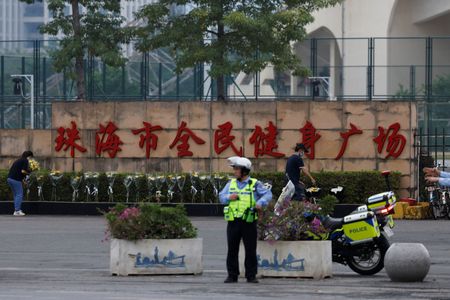(Reuters) – Taiwan votes in four referendums on Saturday that could have a major bearing on its energy and trade policy and are a key test of support for the ruling Democratic Progressive Party (DPP) and the main opposition party, the Kuomintang (KMT).
The DPP is urging a “no” vote for all, while the KMT is urging a “yes” vote.
Following are the four issues up for consideration and their significance:
LNG TERMINAL
The government wants to build a third LNG terminal in northern Taiwan’s Taoyuan to help secure stable energy supplies but some environmental groups and opposition parties say the plan will destroy an algal reef.
The question, proposed by an environmentalist, asks whether the government should move the terminal away from the reef.
The government has said it will resite the project further offshore to minimise the impact on the reef but the vote seeks a complete relocation, which would likely delay it by several years.
PORK IMPORTS
This referendum question, proposed by the KMT, asks whether the government should ban the import of pork containing ractopamine, an additive that enhances leanness. It is banned in the European Union and China but widely used in the United States.
The government approved pork containing ractopamine last year, hoping to remove a stumbling block for a free trade deal with the United States and show it is reliable trading partner. The KMT objected on safety grounds.
Major Taiwan food firms have pledged not to sell or import pork, the island’s most popular meat, if it contains ractopamine. Most pork sold in Taiwan is raised on the island.
Taiwan allowed imports of U.S. beef containing ractopamine in 2012, with the support of the previous KMT government.
NUCLEAR POWER
The question, proposed by a nuclear power advocate, asks whether the government should restart construction at a mothballed fourth nuclear power plant on Taiwan’s northeastern coast and put it into operation.
The government says it is committed to phasing out nuclear power in favour of greener alternatives like LNG and renewables. The KMT supports nuclear power as a greener alternative to coal, which now holds the largest share in Taiwan’s power generation.
REFERENDUM ON REFERENDUMS
This question asks whether such votes should take place on the same day as major elections. The DPP says that could cause chaos, confusion and long waiting times at voting stations, pointing to the 10 referendums that took place at the same time as local elections in 2018.
The KMT, which submitted this question, says the change would save money and resources, while boosting turnout.
HOW THE VOTING WORKS
Turnout is key. For a referendum to pass, at least 25% of the island’s roughly 20 million eligible voters need to vote in favour. So there must be at least about 5 million “yes” votes, and “yes” votes must exceed “no” votes.
The results should be clear by Saturday evening.
If the LNG, pork and nuclear votes pass, the presidential office or relevant ministry must make the next decisions on how to proceed.
If the vote on referendums passes, the Cabinet has three months to send relevant legislation to parliament for approval.
Sources: Reuters, DPP, KMT, Taiwan’s Central Election Commission, Taiwan’s Central News Agency
(Reporting by Ben Blanchard; Editing by Edmund Klamann)











